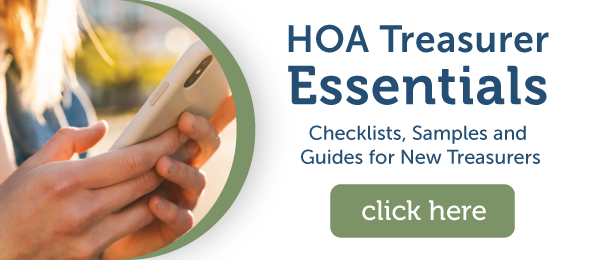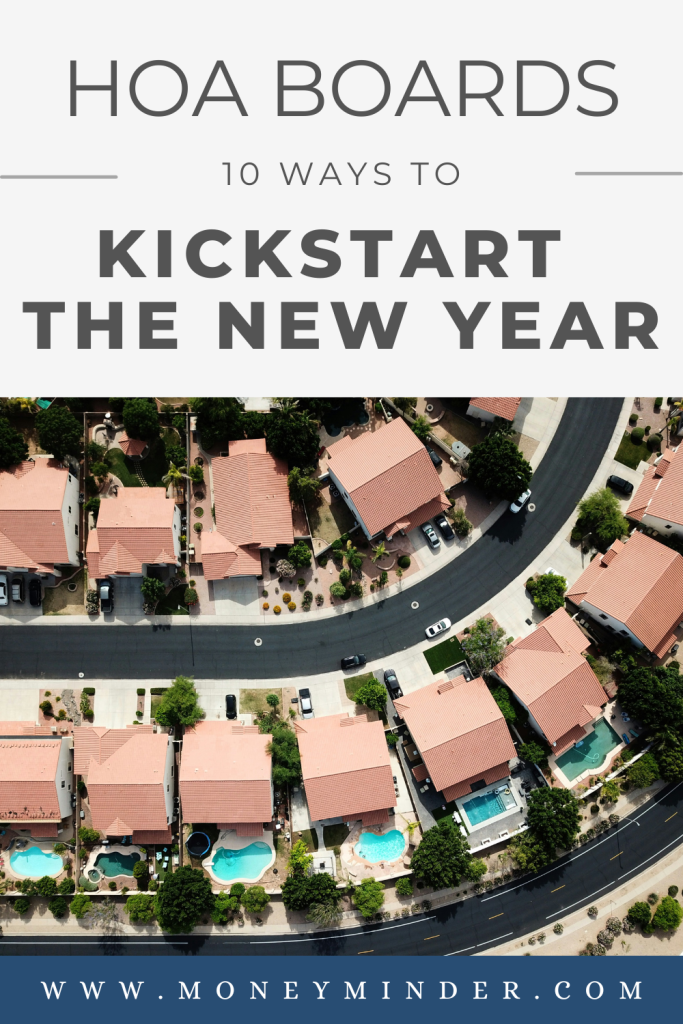Most Homeowners Associations operate on the fiscal year starting January 1st. So, welcome to a new year in the adventures of shaping your community’s future. The decisions you make in the these early days of the year will carve a path to a successful and well-managed year ahead.
Steer your HOA toward a year filled with growth, prosperity and a strengthened sense of community spirit. These ten tasks for the beginning of the year will help ensure a smooth trajectory for months to come.
1. Prioritize Upcoming Projects
Reviewing the latest reserve study at the beginning of the year can help the board plan for necessary repairs and replacements and their associated expenses. Identify upcoming projects and prioritize them. Develop a clear action plan, making sure to consider budget adjustments, reserve fund utilization or the necessity of a special assessment to pay for the projects.
2. Schedule Your Next Reserve Study
Reserve studies should be completed on a regular basis to ensure ongoing financial preparedness. As far as cadence, this is typically done annually with a larger, more comprehensive assessment done every three years. The specific interval is dictated by state laws and your association’s governing documents.
3. Analyze the Budget
Commence the fiscal year with a comprehensive review of the previous year’s financial performance. Collaborate with the association treasurer, accountant, board officers and other stakeholders to ensure a meticulous evaluation. Identify areas where reallocations or modifications are necessary to accommodate projects from the reserve study. At the same time, evaluate the health and balance of the reserve fund.

4. Assess Vendor Contracts
Do you have longstanding vendor contracts that are in place just because it’s always been that way? Ensure your contractors and contracts are aligned with the HOA’s needs and standards, and consider putting contracts “out to bid” for a fresh perspective (and potentially, cost-savings).
5. Update Your Governing Documents
When is the right time to update your group’s governing documents? Bylaws, CC&Rs and Rules and Regulations should be reviewed annually, no matter what. These are rules by which your HOA lives, so that decisions aren’t made on the fly. Consider the year that has just passed and decide if anything has changed that would warrant an adjustment to your documents. Do you need to edit your emergency preparedness plan or consider eco-friendly initiatives within the community? To make changes, first refer to your bylaws where the process for this should be outlined.
6. Transition New Board Members
Homeowners Association Board Members tend to have a longer tenure than many other groups that MoneyMinder works with. Still, there’s turnover from time to time. If you held your election at the end of the year and there are new board members, take this time to ensure a smooth transition. If you haven’t already, consider taking these steps:
- Alert the community about the transition
- Schedule an orientation session with the new and outgoing board members
- Compile and hand over important documents related to the board member’s projects
- Communicate any outstanding projects or issues to the new member
- Pass along budgetary and financial information to a new treasurer, including providing access to your HOA accounting software
- Ensure the new member reviews and is familiar with your governing documents

7. Evaluate Committees
HOA committees are the backbone of effective governance. Take stock of your HOA’s committees and evaluate their performance from the past year. Determine if new committees are necessary for specific projects or if existing ones have served their purpose and can be disbanded.
8. Gather Community Input
Schedule a forum to gather input from home, condo or property owners. Encourage an open discussion about concerns, suggestions and ideas. This creates a sense of involvement and ensures the board is aligned with resident needs. If your community tends to have high tension or conflict, this could also be done anonymously via a survey or questionnaire.
9. Communicate Openly with Homeowners
Will there be sidewalk closures for part of June? Will the pool be closed for scheduled maintenance? What about construction projects that might have a noise impact? All of these have an effect on homeowners’ lives and should be communicated clearly. Although it might seem like overkill, err on the side of the most clear communication possible to foster an environment where residents feel included and have minimal surprises.
10. Plan for Community Events
Events can serve as a great way to foster neighborly bonds. If you live in a place that regularly holds community events, this is probably already on your radar for the calendar year. If your community members tend to maintain some distance from one another, you might still want to consider something to give neighbors the chance to interact. This could be as simple as an unveiling of a new shared space or a full blown community potluck.
Here’s to a year of collaboration, connection and shared successes for your HOA. We wish you a prosperous and joyful year ahead in your board member role.

 Connect your Venmo account to MoneyMinder PRO to directly download transactions, saving you time and effort. You just review the transactions to ensure they are properly categorized and fill out any required fields.
Connect your Venmo account to MoneyMinder PRO to directly download transactions, saving you time and effort. You just review the transactions to ensure they are properly categorized and fill out any required fields. Connect your Bank, Square and PayPal accounts to MoneyMinder PRO to directly download transactions, saving you time and effort. You just review the transactions to ensure they are properly categorized and fill out any required fields.
Connect your Bank, Square and PayPal accounts to MoneyMinder PRO to directly download transactions, saving you time and effort. You just review the transactions to ensure they are properly categorized and fill out any required fields. Connect your Bank, Paypal and Square accounts to MoneyMinder PRO to directly download transactions, saving you time and effort. You just review the transactions to ensure they are properly categorized and fill out any required fields.
Connect your Bank, Paypal and Square accounts to MoneyMinder PRO to directly download transactions, saving you time and effort. You just review the transactions to ensure they are properly categorized and fill out any required fields. Connect your Bank, Paypal and Square accounts to MoneyMinder PRO to directly download transactions, saving you time and effort. You just review the transactions to ensure they are properly categorized and fill out any required fields.
Connect your Bank, Paypal and Square accounts to MoneyMinder PRO to directly download transactions, saving you time and effort. You just review the transactions to ensure they are properly categorized and fill out any required fields. Join It is a membership management service that helps businesses and nonprofits effectively sell, track, and grow their membership.
Join It is a membership management service that helps businesses and nonprofits effectively sell, track, and grow their membership.